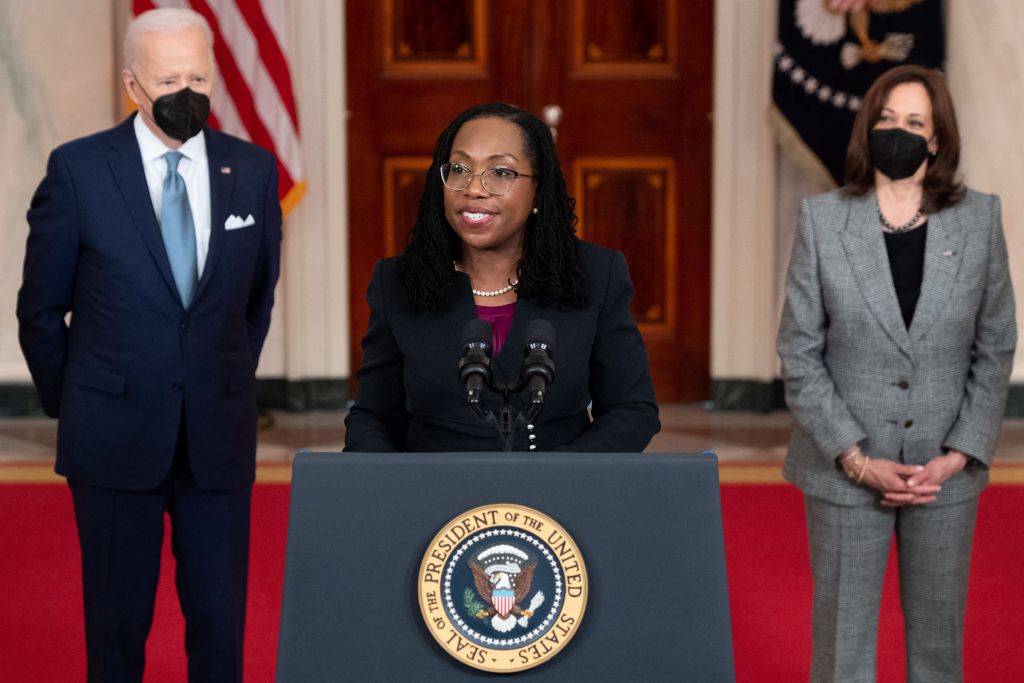Ketanji Brown Jackson: Senate Given Nomination, Fast Confirmation Urged
Senate Receives Ketanji Brown Jackson’s Supreme Court Nomination Amid Calls To Expedite Confirmation

Judge Ketanji Brown Jackson, with President Joe Biden and Vice President Kamala Harris, speaks after being nominated for the U.S. Supreme Court at the White House in Washington, D.C., on February 25, 2022. | Source: SAUL LOEB / Getty
The U.S. Senate has received the historic nomination for Ketanji Brown Jackson‘s historic nomination to the U.S. Supreme Court as calls grow louder for the confirmation process to be expedited.
The Senate Judiciary Committee tweeted Monday that President Joe Biden had forwarded his nomination of Brown Jackson on the same day, which officially opens the start of the confirmation process.
However, there was no other date attached to the brief, formal note Biden sent the Senate Judiciary Committee, which ultimately votes to determine whether as U.S. Supreme Court nominee will be confirmed.
Pointing to how former President Donald Trump successfully forced through the nominations of Brett Kavanaugh and Amy Coney Barrett in a small window of time, advocates are seeking to have the Senate keep that same expeditious energy this time around. But there are fears that Biden and Brown Jackson will experience the same partisan blockade displayed by Senate Republicans after former President Barack Obama‘s nomination of Merrick Garland was stalled before hitting a brick GOP wall.
Just Democracy, a racial justice coalition, was among groups calling for the swift confirmation of Brown Jackson, who would be the first Black woman to become a sitting justice on the U.S. Supreme Court.
“We urge Congress to move toward a swift confirmation, adhering to a fair and prompt process that Judge Jackson’s impeccable record and experience demands,” Channel Powe, spokesperson for Just Democracy, said in a statement emailed to NewsOne.
Despite a 50-50 split in the U.S. Senate and Democrats having the tie-breaking vote with Vice President Kalama Harris, there are still fears that Senate Republicans won’t prioritize Brown Jackson’s confirmation process.
“Despite her flawless record, we know that Senate Republicans will inevitably delay Judge Jackson‘s nomination and question her qualifications,” Color Of Change President Rashad Robinson said in a statement. “They’ve historically shown that they will do whatever it takes to bolster the discriminatory and conservative status quo – whether it be pushing through the nominations of Brett Kavanaugh and Amy Coney Barrett or hijacking the nomination process for Merrick Garland.”
Robinson emphasized: “We cannot allow for this to happen yet again.”
To be sure, Brown Jackson is among the most overqualified Supreme Court nominees in recent memory.
Jackson was in June confirmed to serve on the Court of Appeals for the D.C. Circuit, making her only the third Black woman to work in that capacity. Prior to that, Jackson had served as a judge for the U.S. District Court of the District of Columbia since 2013.
Jackson was on Obama’s shortlist to replace Supreme Court Associate Justice Antonin Scalia when he died in 2016. She was nominated to the U.S. District Court for the District of Columbia by Obama back in 2012.
Notably, Jackson ruled in 2018 that Donald Trump overstepped his authority as the president in an order restricting the ability of federal employees to collectively bargain. Jackson also has a promising record when it comes to health and wellness. In a 2013 case, meatpackers tried to block Obama administration regulations requiring labels to identify an animal’s country of origin. Jackson upheld the rule to which the meatpackers appealed and lost.
In addition to her valuable experience on the bench, Jackson previously worked as a federal public defender and was a U.S. Sentencing Commission member.
Judith Browne Dianis, executive director of the Advancement Project – National, previously told NewsOne that while the prospect of a Black woman on the bench is exciting, the nomination should consider the person’s background and ability to contextualize history and its impact on constitutional interpretations.
“There’s a Black person who sits on the Supreme Court, and when we say we want to Black person on the Supreme Court, we don’t need another repeat of that person,” Browne Dianis said. “It’s the opportunity to have a Black person who understands the history of the Constitution, but also understands how race and the law have been inextricably tied together since the founding of this country.”
SEE ALSO:
OP-ED: For Black Women, Racism, Denial and Disrespect Never End; But Still We Rise


















